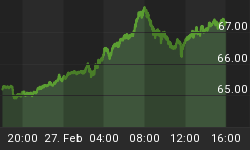After reviewing a host of technical and fundamental data, we are of the view that the world's stock and commodity markets may be on the verge of a big slide. Remember, for almost two years, the Federal Reserve supported the 'risk trade' via quantitative easing. However, it has now left the party, which means that the private-sector credit contraction in the developed world is reasserting its upper hand. For instance, a variety of credit spreads are rising, interest rates on Eurodollars are appreciating (shortage of dollars outside the US), the Federal Reserve is desperately trying to provide liquidity via its swap lines and the US Treasury market is signaling a severe economic contraction.
Furthermore, the US Dollar Index has broken above its 50-day and 200-day moving averages, the VIX is elevated and the NYSE Operating Companies Only Advance/Decline Line has broken below its recent consolidation range. Thus, all the key data points we monitor are flashing red and this is the time to be defensive.
It is notable that already, the MSCI Emerging Markets Index has broken below its early August low and a number of the European stock markets have also done the same. On the contrary, the US indices are still relatively firm and a clear break below the recent lows will open up the possibility of a serious sell off. Moreover, the prices of various industrial commodities have softened recentlyand this suggests that the global economy is slowing down considerably.
As you know, we sold out of precious metals/commodities last week and earlier in the week, we have almost liquidated our other 'long' positions in stocks. Furthermore, we have been busy putting out our 'short' positions and currently our net 'short' exposure is around 30%, plus we are sitting on a large amount of US Dollar cash. If the market conditions deteriorate further, we may add to our 'short' positions.
Look. The markets are skating on thin ice and obviously, we do not know the future. However, we do know that the market's internals are weakening and credit strains are emerging. Usually, this combination does not have a happy ending, but as usual, we will take our cue from the price action. Should the S&P500 take out its early August low, a more serious decline will follow in all 'risky assets' and we could witness an epic autumn contraction. On the other hand, under the best case scenario, major US indices may refuse to break down and commence a base building period. The good news is that we are well positioned for either scenario and depending on what unfolds, we will make changes to our portfolio. Unfortunately, certainty does not exist in the investment business!
Now, we are aware that some of you may have an emotional attachment with gold, thus you may insist on keeping your physical bullion and related stocks. We do not have a problem with this view, but we just want you to be aware that during a genuine liquidation climax, precious metals will also feel the heat. If history is any guide, during a genuine forced liquidation, only the world's reserve currency, US Treasuries and German Bunds will appreciate and every other asset is likely to deflate. Once again, this is not a prediction; we are simply stating historical facts.















